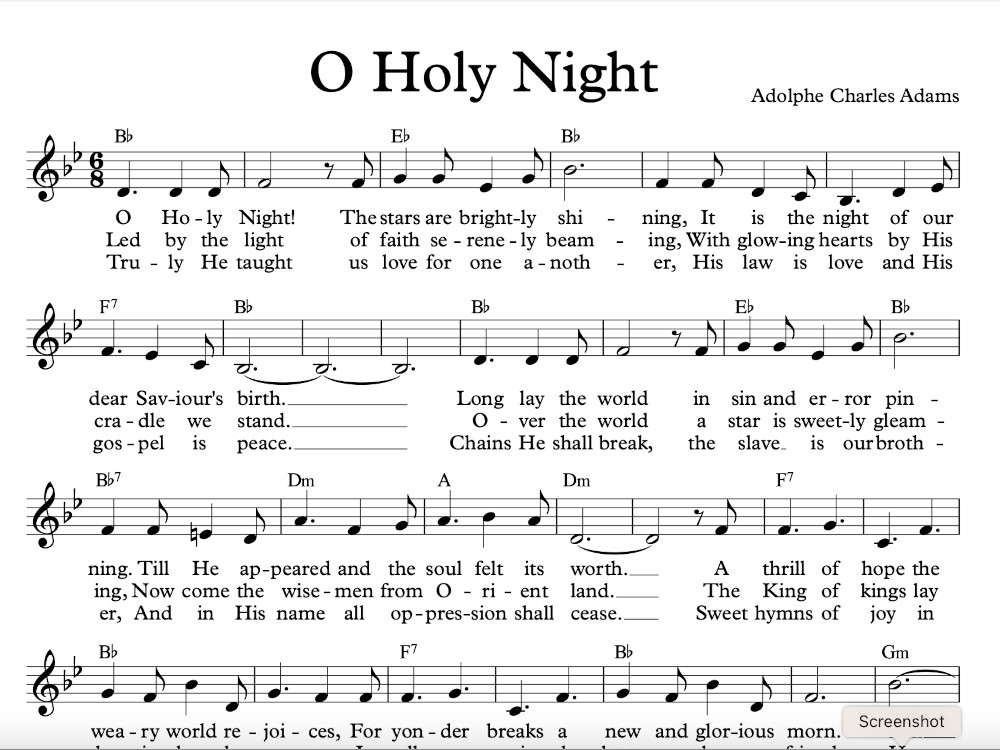O Holy Night, the Christmas carol set to soaring music, was banned in the land of its origin, France. It has a distinctly egalitarian flavour, but the ban came when the author of the poem that forms its lyrics denounced the church.
In the modern English version, we sing in the third verse:
“Truly He taught us to love one another;
His law is love and His Gospel is Peace
Chains shall He break, for the slave is our brother
And in His name, all oppression shall cease
Sweet hymns of joy in grateful chorus raise we
Let all within us Praise His Holy name
Christ is the Lord; O praise His name forever!
His power and glory evermore proclaim
His power and glory evermore proclaim.”
This is too much for some. Sovereign Grace, an influential source of songs for conservative evangelicals, has produced a different version.
“Come, then, to Him Who lies within the manger, With joyful shepherds, proclaim Him as Lord. Let not the Promised Son remain a stranger;
In reverent worship, make Christ your Adored. Eternal life is theirs who would receive Him; With grace and peace, their lives He will adorn. Fall on your knees! Receive the Gift of heaven! O night divine, O night when Christ was born
O night, O holy night when Christ was born.”
That is only the latest way this carol has been modified, censored or banned. In 1843 or 1847, Placide Cappeau, a local poet in the small French town of Roquemaure, was asked by a local priest to write a Christmas song to commemorate the renovation of the church organ.
Cappeau and Adolphe Adam who was famous for his ballet Giselle, had a mutual friend who was able to help the poet meet the composer, and the carol gained its soaring music.
After twenty years of being banned in France, the Carol named “Minuit, Chrétiens”‘” was rehabilitated through a story that deserves to be true. During the Franco-Prussian war, a French soldier jumped from the trenches as they were being attacked and started to sing the song. The Germans sang a hymn by Martin Luther before a truce was declared.
If the English third verse is too much for some, then consider the original French second and third verses.
The first verse asks us to fall on our knees, as in the English version.
The ardent light of our Faith,
Guides us all to the cradle of the infant,
As in ancient times, a brilliant star
Conducted the Magi there from the Orient.
The King of kings was born in a humble manger;
O mighty ones of today, proud of your grandeur,
It is to your pride that God preaches.
Bow your heads before the Redeemer!
Bow your heads before the Redeemer!
The Redeemer has broken all shackles.
The earth is free, and heaven is open.
He sees a brother where there was once but a slave;
Love unites those who restrain the sword.
Who will tell him our gratitude?
It is for us all that he was born, that he suffered and died.
People, stand up, sing your deliverance!
Christmas! Christmas! Let us sing the Redeemer!
Christmas! Christmas! Let us sing the Redeemer!
“Having ordered listeners to kneel, ‘Minuit, Chrétiens’ then instructs them to rise, in a way similar to the later left-wing anthem “L’Internationale” (1871), which begins, “Arise ye damned of the earth,” The US Jesuit magazine America points out. “Telling oppressed people to rise up is common in anthems, but ‘L’Internationale,’ written by Eugène Pottier, may have partially reflected Placide Cappeau’s poem from a generation earlier.”
Catholic writers also criticised ‘Minuit, Chrétiens’ for having been written by “a socialist drunk.” A line in the first verse, “Et de son Père arrêter le courroux/And to put an end to the wrath of his father,” attracted the wrath of those who do not like to speak of the wrath of God – similar to criticism of the Stuart Townend and Keith Getty’ In Christ Alone.
John Sullivan Dwight, an American writer who popularised the English version of the carol, was careful to preserve – to some extent at least, the radical content. His third verse, noted above, teaches the sisterhood and brotherhood of humankind. “He published the updated version in his magazine, ‘Dwight’s Journal of Music,’ which propelled the song to popularity in the United States and, particularly, in the North during the Civil War as abolitionists related to the anti-slavery sentiment“.” the United Methodist News recounted.
Is egaliatrian sentiment innapropriate at Christmas? The best argument for an egalitarian-flavoured Christmas comes from the poem embedded in Luke’s Account.
Mary, inspired by the Holy Spirit, sings of God.”
…His mercy extends to those who fear him,
from generation to generation.
He has performed mighty deeds with his arm;
he has scattered those who are proud in their inmost thoughts.
He has brought down rulers from their thrones
but has lifted up the humble.
He has filled the hungry with good things
but has sent the rich away empty.
The Gospel is the great leveller of humankind. Those who shy away from the lyrics of Oh Holy Night miss out on the implications of the gospel that Mary saw.


We ignore the truth of the gospel at our peril. “In his name all oppression shall cease” is made possible because of Jesus coming to earth as a human baby yet God and dying as a man yet still God to take ignoring God and its consequences from us on himself. He experienced the greatest oppression in order to cease it.
No institution gets to change the truth.